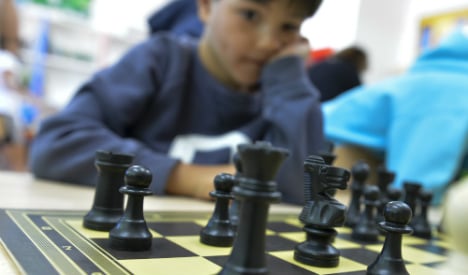Eleven-year-old Alvaro Pineda has played chess at home since he was five. Now he plays it in the classroom too.In an effort to boost their pupils' low maths and reading marks, more and more Spanish schools are holding chess clubs – and some could even make it a compulsory class.
“It really increases your mental capacity. I have improved a lot,” said Alvaro, at a chess group in his school north of Madrid.
“You have to really focus on the board and on where all the pieces are, and think lots of moves ahead,” which helps strengthen the memory, he added.
Spain's parliament this year unanimously adopted a law allowing regional governments to introduce chess as a compulsory or optional subject in schools.
The law won the rare unanimous backing of lawmakers from rival parties.
The opposition Socialist Party deputy who drafted it, Pablo Martin Pere, cited studies showing that an hour of chess a week could boost pupils' performance in maths by 30 percent.
Education studies by the OECD economic grouping have regularly shown that Spanish pupils lag behind their peers in other developed countries in maths and reading.
School masters
The class Alvaro goes to, in the Aldebaran School in the Madrid suburb of Tres Cantos, is run by masters from the local chess club.

Students play chess at a Tres Cantos state school. Photo: Pedro Armestre / AFP
Some say however that regular teachers can be trained for the task.
One of the instructors, Javier Martinez de Navascues, 24, divides the lesson time between chess games, theory and showing the pupils “cool things that they really like, moves like 'the nail' and the 'x-ray attack'”
He says two or three weeks' training is enough to prepare a normal school teacher to give chess classes.
The local chess club's president Daniel Gil disagrees.
“It is just as well that the instructors be chess masters,” he said.
“They have a certain experience of teaching,” he said, but chess classes also require special knowledge. “There's a lot to chess.”
Chess 'not boring'
The southern Russian region of Kalmykia is seen as the pioneer in using chess as an official educational tool, having introduced it as a school subject in 1996.
Armenia became the first country to apply the policy nationwide in 2011. Mexico followed in 2014, as well as parts of China, India and Germany.

Students play chess at a Tres Cantos state school. Photo: Pedro Armestre / AFP
In Spain, one of the game's leading figures is Adriana Salazar, an international chess master and nine-time national champion in her native Colombia.
She introduces the game to kids as early as pre-school by putting a giant chessboard on the floor.
“They learn the squares, the rows and columns, the diagonals, and we jump around on the board. I tell the smallest kids it is a land of vanilla and chocolate.”
Her method is used in 143 schools in Spain, 50 in Colombia and 12 in Miami. She says it can help develop children's thinking and their “social skills and values”.
“The aim is to make the kids love it and to charm the teachers,” to show them “it isn't boring or hard,” said Salazar. “That is my quest.”
In Tres Cantos, Rodrigo Gomez, 11, turns to his teacher in triumph.
“Javi had two defences and I still got him in checkmate!” he calls out. “This should be compulsory,” he adds.
Nine-year-old Adam Maltoni is more circumspect. “I wouldn't like it to be compulsory. It's each person's choice whether they want to play chess.”
By Julia Estelles / AFP



 Please whitelist us to continue reading.
Please whitelist us to continue reading.
Member comments